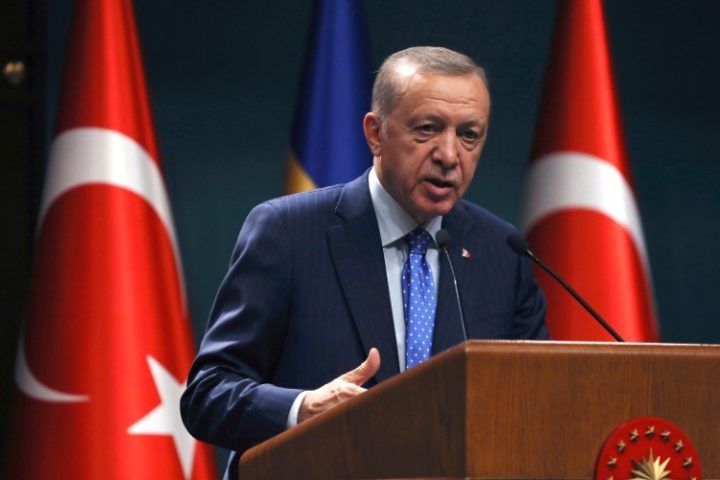
Turkish President Recep Tayyip Erdoğan indicated on January 29 that Ankara may permit Finland to join NATO before Sweden, amid frosty relations with Stockholm.
“We may deliver Finland a different message [on their NATO application] and Sweden would be shocked when they see our message. But Finland should not make the same mistake Sweden did,” Erdoğan announced in a televised speech aired on Sunday.
Last year, following the start of the Ukraine-Russia crisis, Sweden and Finland applied for NATO membership. The success of their application hinges upon the approval of all member countries of NATO. Turkey and Hungary have not ratified the Nordic countries’ membership.
Turkey claims Sweden contains what Ankara regards as militants from the barred Kurdistan Workers Party (PKK), which took up arms against the Turkish state in 1984. Ankara claims Kurdish militants were responsible for a 2016 coup attempt in Turkey.
“We gave Sweden a list of 120 persons and told them to extradite those terrorists in their country. If you don’t extradite them, then sorry about that,” Erdoğan said, alluding to Turkey’s deal with Sweden and Finland last June over their NATO application.
Besides, Turkey suspended NATO discussions with Sweden and Finland after a protest in Stockholm in which a politician burned a copy of the Koran.
Although Swedish Prime Minister Ulf Kristersson said his country wanted to reboot NATO dialogue with Turkey, Turkish Foreign Minister Mevlüt Çavuşoğlu said it was meaningless to restart talks.
Çavuşoğlu added there was “no offer to evaluate Sweden and Finland’s NATO membership separately.”
“Those who allow such blasphemy in front of our embassy can no longer expect our support for their NATO membership,” Erdoğan said in a speech referring to the burning of the Koran after a Cabinet meeting.
“If you love members of terrorist organizations and enemies of Islam so much and protect them, then we advise you to seek their support for your countries’ security,” he said.
Swedish Foreign Minister Tobias Billstrom declined to immediately comment on Erdoğan’s remarks, telling Reuters in a written statement that he wanted to comprehend exactly what had been said.
“But Sweden will respect the agreement that exists between Sweden, Finland and Turkey regarding our NATO membership,” he added.
Meanwhile, U.S. State Department Spokesperson Ned Price said Finland and Sweden are ready to join the alliance, but did not comment on whether Washington thought Erdoğan’s remarks meant preventing the Nordic countries from doing so.
“Ultimately, this is a decision and consensus that Finland and Sweden are going to have to reach with Turkey,” Price said.
Price said to reporters that burning religious books is a gravely disrespectful act, adding that the United States is aware that those who may be behind what took place in Sweden may be intentionally attempting to undermine unity across the Atlantic and among Washington’s European allies.
“We have a saying in this country — something can be lawful but awful. I think in this case, what we’ve seen in the context of Sweden falls into that category,” Price said.
The Koran-burning was carried out by Rasmus Paludan, leader of Danish political party Hard Line. Paludan, who also has Swedish citizenship, has organized various demonstrations in the past where he burned the Koran.
Several Arab countries, including Saudi Arabia, Jordan, and Kuwait, decried the Koran-burning. Furthermore, Turkey summoned Sweden’s ambassador and canceled a planned visit by the Swedish defense minister to Ankara.
In a memorandum of understanding signed by the three countries at a NATO summit last year, Sweden and Finland pledged not to back Kurdish militant groups and to end arms embargoes on Turkey enforced after its actions in northern Syria in 2019.
However, the recent pro-Kurdish and anti-Turkish demonstrations in Stockholm, with a separate pro-Kurdish demonstration organized later, threatened to weaken relations among the three countries.
Erdoğan insisted that Sweden and Finland must deport or extradite up to “130 terrorists” to Turkey before the country approves their NATO applications.
“We said look, so if you don’t hand over your terrorists to us, we can’t pass it [approval of the NATO application] through the Parliament anyway,” Erdoğan said while alluding to a joint press conference he held with Swedish Prime Minister Ulf Kristersson last November.
“For this to pass the Parliament, first of all you have to hand more than 100, around 130 of these terrorists to us,” Erdoğan said.
Finnish politicians saw Erdoğan’s demand as a furious reaction to an event in Stockholm last week in which an effigy of the Turkish leader was strung up.
“This must have been a reaction, I believe, to the events of the past days,” Finland’s foreign minister, Pekka Haavisto, told public broadcaster YLE.
“We stress that in Finland and in Sweden we have freedom of expression. We cannot control it,” the speaker of the Finnish Parliament, Matti Vanhanen, said.
Nonetheless, Kristersson said that his country was in a “good position” to ensure Turkey’s ratification of its NATO application.
Erdoğan’s spokesman, Ibrahim Kalin, said that time was running out for Turkey’s Parliament to ratify the bids before the presidential and parliamentary elections poised to be held in May.
Haavisto said he still hoped Finland and Sweden would become NATO members in the next few months.
“I still see the NATO summit in Vilnius in July as an important milestone when I hope that both counties will be accepted as NATO members at the latest,” Haavisto said.
While Sweden has said it regards Turkey’s security fears seriously and is enacting the three-way agreement signed in June last year, Ankara says its efforts are insufficient.
That has led to rumors that Finland — which shares an 810-mile border with Russia — could join NATO without Sweden.
Nonetheless, Haavisto said security guarantees from the United States, the U.K., and other NATO members implied that Finland could afford to wait a bit more.
“We appreciate those security assurances very much even if we understand that it is not the same as NATO Article 5, but it is very important for us,” he said.
Article 5 of the North Atlantic Treaty, NATO’s founding document, obliges all members to mutual defense, asserting that an attack against one is an attack against all.
Rising from the ashes of World War II, NATO was set up by 10 European countries, the United States, and Canada to form a security fortress against the communist-ruled Soviet Union. It was meant to be a key tenet of the post-World War II global order.
Additionally, after the war, Turkey, eager for security and status, sent its troops to back U.S. and United Nations (UN) forces fending off North Korea’s attempted invasion of the southern part of the peninsula. These Turkish moves merited accolades from many Western nations.
In 1952, Turkey joined NATO, hoping to boost its aspirations to become a Western nation to counter a rising Soviet Union. It was the first expansion of NATO after the founding of the group in 1949.



